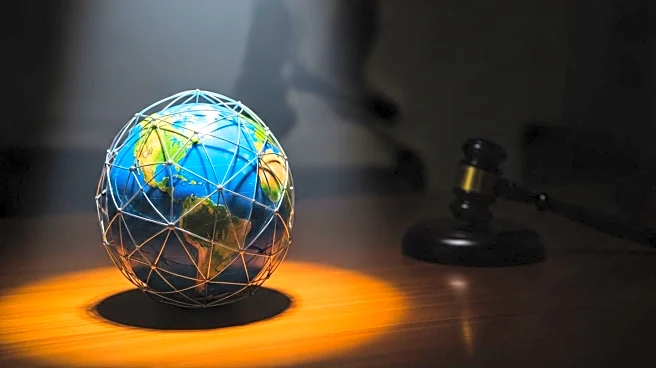What is the story about?
What's Happening?
The United Nations, marking its 80th anniversary, is currently facing significant challenges due to deadlocks in the Security Council over key global issues. The U.S. has been using its veto power to shield Israel from criticism regarding its conflict with Hamas in Gaza, while Russia continues its aggressive actions in Ukraine, attempting to redraw borders by force. These geopolitical tensions have hindered the U.N.'s ability to effectively address these conflicts. As Secretary-General Antonio Guterres' term nears its end, discussions are underway about potential candidates to lead the organization. Historian Thant Myint-U emphasizes the importance of revisiting the U.N.'s foundational purpose to address current and future challenges, including the prospect of major power wars.
Why It's Important?
The deadlock in the U.N. Security Council highlights the limitations of the organization in resolving major international conflicts, affecting global stability and peace efforts. The U.S. and Russia's use of veto power underscores the influence of major powers in shaping U.N. actions, often at the expense of smaller nations seeking a voice. The upcoming leadership transition presents an opportunity to reassess the U.N.'s role and effectiveness in preventing wars and fostering international cooperation. The outcome of this transition could significantly impact global diplomatic strategies and the U.N.'s ability to address pressing issues like climate change, human rights, and conflict resolution.
What's Next?
As the U.N. considers new leadership, there is a call to refocus on its original mission of preventing war and promoting internationalism, empathy, and solidarity. The selection of a new Secretary-General will be crucial in determining the organization's future direction and its ability to navigate complex geopolitical landscapes. Stakeholders, including member states and civil society groups, are likely to engage in discussions about reforming the U.N. to enhance its relevance and effectiveness in addressing global challenges. The process will involve balancing the interests of major powers with the needs of smaller nations and marginalized communities.
Beyond the Headlines
The current situation at the U.N. reflects broader issues of international governance and the challenges of maintaining global peace in an era of rising nationalism and geopolitical rivalry. The organization's struggle to fulfill its mandate raises questions about the efficacy of multilateral institutions in a rapidly changing world. Ethical considerations about the use of veto power and the representation of diverse voices within the U.N. are likely to be central to ongoing debates about its future role. Long-term shifts in global power dynamics may necessitate a reevaluation of the U.N.'s structure and decision-making processes.















